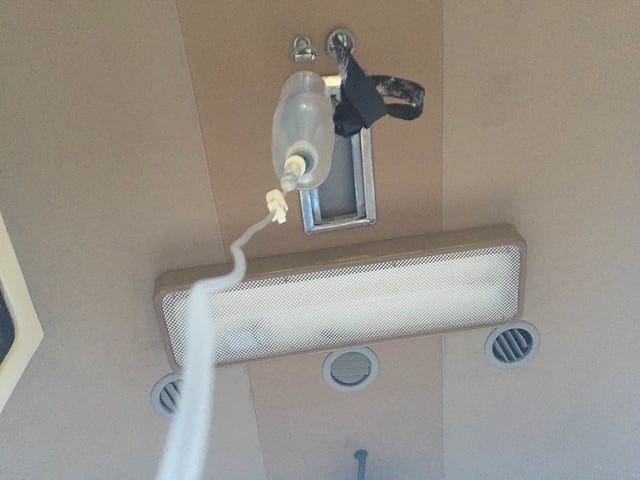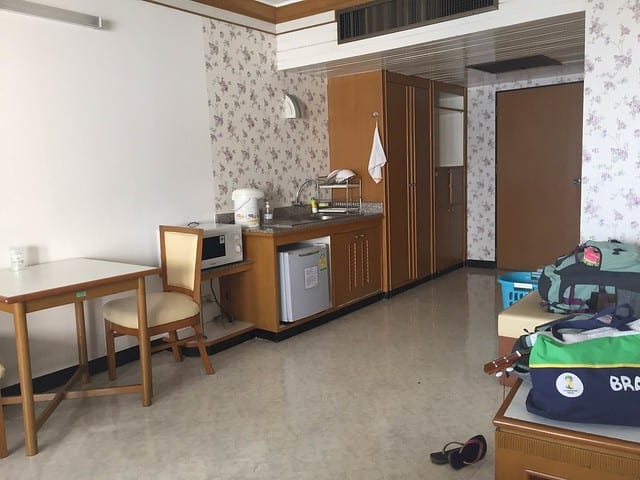Imagine this: you’re alone in unfamiliar territory, and maybe you’re feeling the pangs of solitude associated with traveling. Everything is going smoothly, and the threat of something bad happening doesn’t even cross your mind. Perhaps you’re far, far away from the nearest big city, without reliable cell service or internet access. And then something happens where you really need immediate help.
For me, that “something” was an emergency appendix removal surgery in Thailand. For you, it could be something else.
Aside from my appendectomy, I also suffered from bouts of allergic reactions, a sprained ankle, and food poisoning throughout my solo travels. And, every time I was crawling on the floor in the dark trying to find my pain medication in the bottom of my backpack, or a trash can to puke in, or my phone so I could call for help, I felt like I’d reached the ultimate low.
Ask anyone who has traveled long-term and they’ll tell you that it’s not always easy. I’d met travelers who had suffered motorbike accidents, bacterial infections, and broken bones. Even more common were people who had been robbed, or pickpocketed, or had lost important documents or cash that left them virtually penniless.
However, even in challenges, we can bounce back, and most sad stories end up working out in the end. No one is immune to tough situations and it’s important to be prepared, even if you think that nothing bad could come your way.
So what should you do when a crisis happens?
Contents
Get Travel Insurance

I can’t stress this enough so I’ll say it again – get travel insurance. Without insurance, you are really subjecting your life, your health, and your valuable items to terrible things that could befall you. I paid just $300 for my 4-month plan, which was a small price compared to the price of my two hospitals, my ambulance, and my 2-week mandatory stay in Chiang Mai once I was discharged.
Do your research to find a plan that works best for you. Some plans are better for people who like to participate in adventure activities like diving or hiking. Others are better for people with expensive equipment, like cameras or computers. There are some that do a little of everything. Search through some of the many providers to find a plan that works for you and your travels.
Don’t Hesitate
If you think that something serious is happening, take action immediately. In my case, if I’d waited just one day more, I could have died from a ruptured appendix. When I decided to get help, it was 6 in the morning and no one was awake at my guesthouse.
This is why you should always keep in your mind a “backup” way to get help, in case no one is around when you need assistance. For me, that was remembering which room the guesthouse manager stayed in, and knocking on that door immediately when I realized that my pain was severe. Even if your situation isn’t as serious as you thought, it’s better to have acted than not.
Be Vocal

After you’ve decided to get help, you need to be very forward and open about what you need. Telling someone “I don’t feel well” is surely not as strong as “I need to get myself to a hospital immediately.” Be specific in asking for help so that you can get exactly the help you need. Whether that’s a doctor, a lawyer, or something else, it’s important to voice your concerns. Don’t worry about being obnoxious – in an emergency, there’s often little room for error.
If you feel like the help you’re getting isn’t what you need, say something. If you think that additional services or assistance is required, say something. Keep communicating with people and your transitions will be much smoother.
Notify Someone At Home

Even if you’re traveling alone, you don’t have to be lonely. As soon as something is wrong, notify someone back at home so they can help you with logistics and keep your company virtually, even if you are on your own. For me, this was my mom, who helped me get in contact with my boyfriend (who was on a cruise at the time and couldn’t be reached), my aunt who speaks Thai, and my uncle who is a seasoned doctor. This group of people was responsible for ensuring that my ambulance ride, surgery, and hospital stay were completely free of bumps in the road.
Notifying someone at home can have other advantages. If you don’t have money, that person may be able to wire transfer what you need. They can help you file paperwork for insurance. Even more importantly, they can update your loved ones on your status and help you find whatever you need.
Take Care Of Yourself

You are the only person in the world that knows when you are in pain, and most of the time you know what your body needs to feel comfortable and healthy. In order to prevent a crisis in the future, it’s important to take care of yourself and your belongings, so that you don’t end up in a sticky situation!
Although some things like appendicitis are completely unavoidable, being in good physical shape and having a positive outlook can make the difference between a successful recovery and a lousy one. If you are feeling sick, don’t exacerbate the problem by trying to do too much. Relax, get a good night’s rest and eat a healthy meal every so often (even if it costs a bit more) to keep yourself in good health.
When traveling, it’s crucial to stay alert and to always ensure that you’re getting enough exercise, eating healthy, and drinking plenty of water. That way, you can bounce back from medical crises quickly and eventually continue your trip.
As I tell many of my friends and readers, solo travel makes you strong! Keep that message alive by taking good care of yourself, getting help when needed, and always maintaining a positive outlook no matter what crises befall you.
